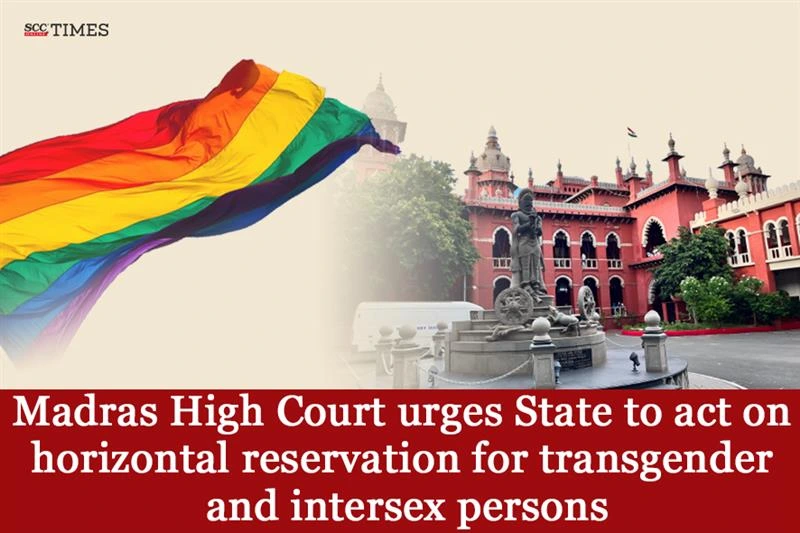Madras High Court: The present petition was filed by the petitioners who sought effective implementation of measures to protect the rights of transgender and intersex persons including framing polices, sensitisation of teachers and addressing systematic discrimination. A Single Judge Bench of N. Anand Venkatesh, J., while recording the State Government’s issuance of Tamil Nadu State Policy for Transgender Persons 2025 (the ‘Policy’), commended the initiative and held that policies aimed at LGBTQIA+ community must be designed and implemented from their perspective. The Court further directed the State to consider incorporating additional community-based suggestions, address reservation in employment and education, and ensure compliance with Supreme Court rulings on marriage and related rights of transgender persons.
Analysis and Observations:
The case began with a petition from a lesbian couple seeking protection from familial threats,but gradually expanded into a wider legal effort aimed at advancing the rights and well-being of gender and sexual minorities across the State.
The Court commended and appreciated the Government of Tamil Nadu for implementing the Policy for transgender persons which was made effective from 31-07-2025. The Court emphasised that such policy had been brought out by six States and Tamil Nadu was the seventh State which had brought out the policy for transgender and intersex persons. Hence, this Court wanted to place on record its appreciation to the Government of Tamil Nadu for coming up with the policy.
The Court placed reliance on Rakshika Raj v. State of Tamil Nadu, 2019 SCC OnLine Mad 22736, and National Legal Services Authority v. Union of India, (2014) 5 SCC 438 and stressed immediate consideration pertaining to Clause 3.7 of the Policy which used the term “Right to Representation in Employment and Educational Institution”, observing that it was not clear as to whether the Government wanted to provide horizontal reservation to the transgender and intersex persons which had always been the request made by the community. The Court further directed the State Government to take a decision in this regard so that the transgender and intersex persons need not knock the doors of this Court every time and seek for reservation in public employment and educational institutions.
The Court highlighted that immediate consideration of the State Government pertaining to the District and State Level Committees to be established to monitor and review policy implementation. Moreover, the State Government must ensure representation of at least one transwoman, transman, and intersex person for effective functioning. The Court pointed out that necessary notification should be issued by appointing the Committees for effective implementation.
The Court observed that marriage of transgender and intersex persons had already been recognized by the Apex Court, however, the real challenge was faced during registration before the Registrar. The Court referred to Arunkumar v. The Inspector General of Registration, 2019 SCC OnLine Mad 8779, reiterated in Supriyo v. Union of India, 2023 SCC OnLine SC 1348, where this Court had directed registration under the Hindu Marriages Act, 1955. Hence, the State Government was required to issue necessary directions to Registrars about legal sanction of these marriages.
The Court suggested the State Government with regards to the deed of familial Association or other types of domestic partnership/civil union which the parties might enter into to govern their rights, since for the present, none of the Succession Acts recognised such rights and therefore, the parties must be able to deal with their own rights by entering into such agreements. The Court asked the State Government to consider the request made by the persons belonging to the community to rename the policy as transgender and intersex persons policy, since the Policy had ultimately been brought about by the Government to support these persons.
The Court emphasised that it must be kept in mind that the Policy was not meant to satisfy the requirements from the perspective of a cisgender or a heterosexual and it must always be addressed from the perspective of those persons who fall within the ambit of LGBTQIA+ community. The Court further highlighted that such policies must benefit them and a Welfare State must ensure that their requirements are understood and they are fulfilled.
The Court urged the State Government to understand and appreciate the request that had been made by the community identifying themselves as transgender and intersex persons and wherever necessary consider making necessary changes in the Policy. The Court further pointed out that, now that the State Government had come out with a policy for transgender and intersex persons, it was time for the Government to formulate a policy for LGBQA+ persons as well, therefore, the Court asked for the process to be expedited.
The matter has been listed for the next hearing on 15-09-2025.
[S. Sushma v. Director General of Police, 2025 SCC OnLine Mad 4464, decided on 04-08-2025]
Advocates who appeared in this case:
For the Petitioners: Vadhana Bhaskar for S. Manuraj
For the Respondents: R. Muniyapparaj Additional Public Prosecutor, Sriram Panchu Senior Counsel, G. Sankaran Senior Counsel for R. Ramasamy, V. Chandrasekaran Senior Panel Counsel, K. Chandrasekar, Subharanjani, R. Thirunavukarasu, B. S. Ajeetha, B. Rabu Manohar, U. Baranidharan, Standing Counsel, Jayna Kothari for Rajagopalan







